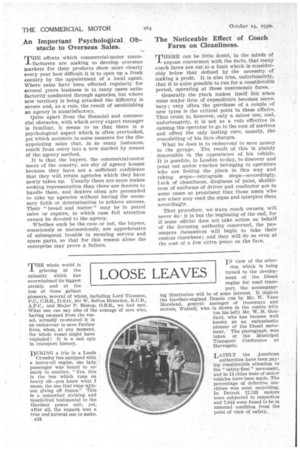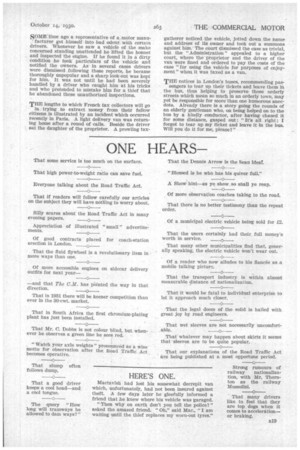LOOSE LEAVES T HE whole world is grieving at the calamity
Page 44

Page 45

If you've noticed an error in this article please click here to report it so we can fix it.
which has overwhelmed its biggest airship and at the loss of those gallant pioneers, several of whom, including Lord Thomson, P.C., C.B.E., D.S.O., Sir W. Sefton Brancker, R.C.B., A.F.C., and Major P. Bishop, 0.B.E., we had met. What one can say also of the courage of men who, having escaped from the vessel, actually re-entered it in an endeavour to save further lives, when, at any moment, the whole vessel might have explo,ded ! It is a sad epic in transport history.
DURING a trip in a Leeds Crossley bus equipped with a heavy-oil engine, one lady passenger was heard to remark to another, "Yes, this is the bus which runs on heavy oil—you know what I mean, the one that runs without giving off fumes."
is a somewhat striking and unsolicited testimonial to the Gardner power unit, yet, after all, the remark was a true and natural one to make.
al8 IN view of the atten tion which is being turned to the development of the Diesel engine for road tram port, the accompanying illustration will be of some interest. It depicts the Gardner-engined Dennis run by Mr. W. Vane Moreland, general manager of tramways and motors, Walsall, who is shown in the centre with (on his left) Mr. W. H. Goddard, who has become well known as an enthusiastic pioneer of the Diesel movement. The photograph was taken at the Municipal Transport Conference at Harrogate.
LATELY the American
authorities have been paying considerable attention to the " gafety-tirst " movement, and in 14 cities tests of motor vehicles have been made. The percentage of defective machines was most surprising. In Detroit 12,133 motors were subjected to inspection and 7,844 were found to be in unsound condition from the point of view of safety. SOME time ago a representative of a motor manu facturer got himself into bad odour with certain drivers. Whenever he saw a vehicle of the make concerned standing unattended he lifted the bonnet and inspected the engine. If he found it in a dirty condition he took particulars of the vehicle and notified the owners. As in several cases drivers were dismissed .following these reports, he became thoroughly unpopular and a sharp look-out was kept for him. It was not until he had been severely handled by a driver who caught him at his tricks and who pretended to mistake him for a thief that he abandoned these unauthorized inspections.
THE lengths to which French tax collectors will go in trying to extract money from their fellow citizens is illustrated by an incident which occurred recently in Paris. A light delivery van was returning home after a round of calls. Beside the driver sat the daughter of the proprietor. A prowling tax gatherer noticed the vehicle, jotted down the name and address of its owner and took out a summons against him. The court dismissed the case as trivial, but the " Administration " appealed to a higher court, where the proprietor and the driver of the van were fined and ordered to pay the costs of the case "for using the vehicle for purposes of enjoyment" when it was taxed as a van.
THE notices in London's buses, recommending pas sengers to tear up their tickets and leave them in the bus, thus helping to preserve those orderly streets which mean so much in an orderly town, may yet be responsible for more than one humorous anecdote. Already there is a story going the rounds of an elderly gentleman who, on being helped on to the bus by a kindly conductor, after having chased it for some distance, gasped out: "It's all right; I forgot to tear up my ticket and leave it in the bus. Will you do it for me, please?"




















































































































